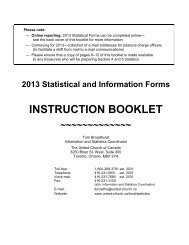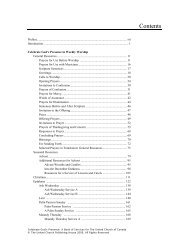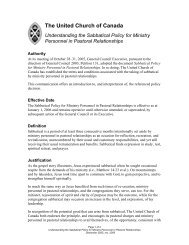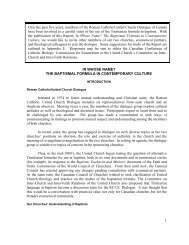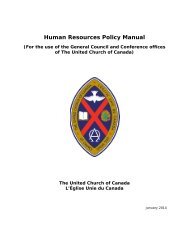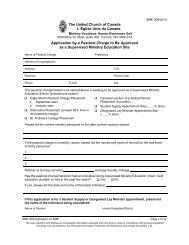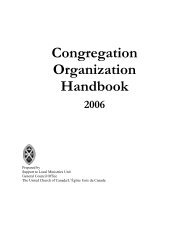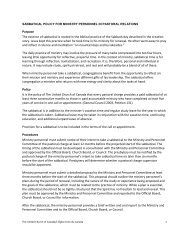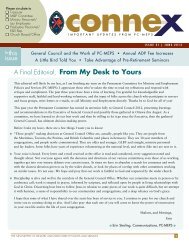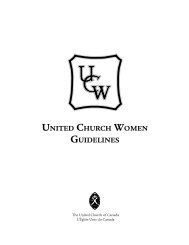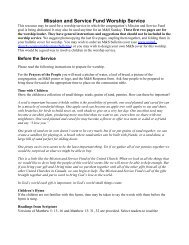Guidelines for Transition Teams - The United Church of Canada
Guidelines for Transition Teams - The United Church of Canada
Guidelines for Transition Teams - The United Church of Canada
Create successful ePaper yourself
Turn your PDF publications into a flip-book with our unique Google optimized e-Paper software.
Appendix 12: Tips <strong>for</strong> Effective Reviews<br />
1. No matter what method is used to collect feedback from a group <strong>of</strong> people, make sure the<br />
purpose <strong>of</strong> the review is clearly communicated, as well as how and to whom the results will be<br />
communicated. Explain that a review is not aimed at describing what was “good” or “bad,” but<br />
rather at assessing to what extent the objectives were reached, and how well the process worked.<br />
2. A valid review takes place only when people are asked to react to appropriate criteria, that is,<br />
against the objectives or goals that were originally set.<br />
3. A valid review ensures that there is feedback from most, or at least a representative sample, <strong>of</strong><br />
those who have experienced or been affected by the work being evaluated.<br />
4. An essential starting point <strong>for</strong> each review is recalling exactly what the purposes were. Citing the<br />
original objectives from reference documents is very important.<br />
5. A review that yields useful in<strong>for</strong>mation will have encouraged the use <strong>of</strong> descriptive, not<br />
judgmental, language. Use focused questions that will yield specific feedback. Avoid asking <strong>for</strong><br />
general impressions or opinions.<br />
6. Prepare people to participate by giving them the questions ahead <strong>of</strong> time so that they can give<br />
more thoughtful answers.<br />
7. When conducting a review in any group, make no assumptions about uni<strong>for</strong>mity <strong>of</strong> opinion.<br />
Encourage the expression <strong>of</strong> all points <strong>of</strong> view so that there can be a thorough analysis <strong>of</strong> what<br />
helped and what hindered the interim process.<br />
8. Ensure confidentiality throughout the collecting, compiling, and disseminating <strong>of</strong> in<strong>for</strong>mation.<br />
9. Ensure that if personal in<strong>for</strong>mation is to be shared, permission to do so has been granted<br />
be<strong>for</strong>ehand by the individuals concerned.<br />
10. <strong>The</strong> final question to every review must be, “What have we learned?” Effective evaluative reviews<br />
will produce in<strong>for</strong>mation and reveal methods that may be useful in the planning and carrying out<br />
<strong>of</strong> future endeavors.<br />
56 <strong>Guidelines</strong> <strong>for</strong> <strong>Transition</strong> <strong>Teams</strong>



